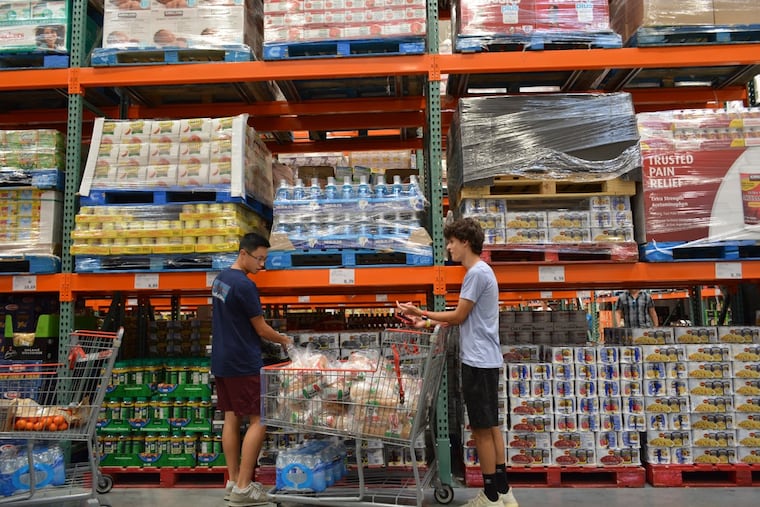‘Regardless of your age, you can still truly make an impact.’ Delco high schoolers are taking on food insecurity.
Food4Philly is entirely student run, and works to donate surplus food from restaurants and grocery stores to local food banks and food pantries.

Ethan Chan was just a freshman in high school when he realized his neighbors in the Philly suburbs were struggling to get by.
The COVID-19 pandemic was ripping its way around the world, and he watched it break much of the stability left in people’s lives, including how they accessed something as essential as food.
During the initial COVID shutdown, Chan learned that one of his close neighbors had started going to food banks and pantries in the area around their Media home.
“I think [that] was just really surreal,” he said.
His mother suggested that their family ought to help out. Ethan and his sister, Megan, rode their bikes up and down their neighborhood, delivering letters to houses nearby asking for food donations. A week later, the Chans swung back around with their minivan to collect the food and drop it off at the Media food bank. Ethan was shocked at how much food people had to offer, and how willing they were to help.
“That really just stuck with me,” he said. “It just really spoke to the impact of COVID and the issue of food insecurity.”
» READ MORE: What is food insecurity? How Philly navigates hunger, food deserts, and access to good food.
A year later, in 2021, Chan was on a Zoom call with several friends. Virtual school had been a drag, and the teenagers were looking for new projects that actually inspired them. They knew they wanted to work on something oriented toward local communities, and Chan brought up his experience addressing food insecurity.
That March, Food4Philly officially launched its website.
Today, Food4Philly is an entirely student-run organization, and has grown from its four cofounders to more than 100 members, and 10 affiliate chapters hosted at different high schools in the Philadelphia area and other states.
“I don’t think any of us had ever started some large organization or project like this before,” said Zaid Salaria, another Food4Philly cofounder. Food insecurity, or a lack of consistent access to affordable, healthy food, is no small issue to tackle in Philadelphia: roughly 1 in 10 people in the area experience food insecurity. Black and Latino households in Philadelphia experience it at double the rate that white households do.
“But we really wanted to be able to reach as many people as possible,” Salaria said.
Food4Philly’s key initiative is its food network, where members work with local restaurants and grocery stores to donate excess food to pantries and food banks.
“[Panera Bread locations] have to bake the bread fresh every single day,” Chan offered as an example of who Food4Philly works with. Panera and restaurants like it want to serve customers its freshest food with every meal, but that often means throwing out otherwise completely edible bread at the end of the day. “There [is] so much food going to waste,” he said.
Feeding America estimates that over 119 billion pounds of edible food is wasted in the United States every year, or roughly 40% of all food.
And while this strategy of reducing waste through redistributing food has been used by other groups in Philadelphia and across the country, being entirely student-run makes Food4Philly stand out.
“Seeing young people involved is terrific,” said Bob King, who oversees the Wayne Food Pantry and has worked with Food4Philly in the past. He noted the growing attention toward food insecurity since the pandemic struck, and is glad to see students giving their time and resources to organizations like his.
“People can make a real difference ... something that looks like maybe a small gesture, like a can of peanut butter, when you get a lot of people involved in a program like that, it really adds up,” he said.
“If you actually have a mission that you believe in ... I feel like regardless of your age, you can still truly make an impact,” Chan said.
» READ MORE: The average family wastes $1,500 in food each year. Drexel Food Lab wants you to eat your garbage.
He estimates that through Food4Philly’s food network, it has helped donate over 10,000 pounds of surplus food to local pantries and food banks. But both cofounders said that events where they get to actually interact with people, like food drives or volunteering at distributions at churches and food banks, has been even more fulfilling.
“I think there’s probably some stereotypes about, [who is food insecure and why] and I think we’ve kind of begun to realize that these stereotypes aren’t true,” Salaria said. “There’s just genuinely good people ... in a financial situation where they need the help.”
Food4Philly is entering a transition phase, like its founders.
Chan and Salaria just graduated from high school, and are heading off to college this fall, attending Queens University in Canada and the University of Pittsburgh respectively. They still plan to be involved with Food4Philly in a big-picture, advisory role, but are looking forward to helping other students take charge of the organization’s day-to-day functions.
“I definitely want Food4Philly to be something bigger than us,” Chan said.
“Everybody in the world, in the United States, and Philadelphia area contributes to this issue. And if everyone does [their] part ... whether it be [with] Food4Philly or other partner organizations, I think that would really mean a lot to us.”